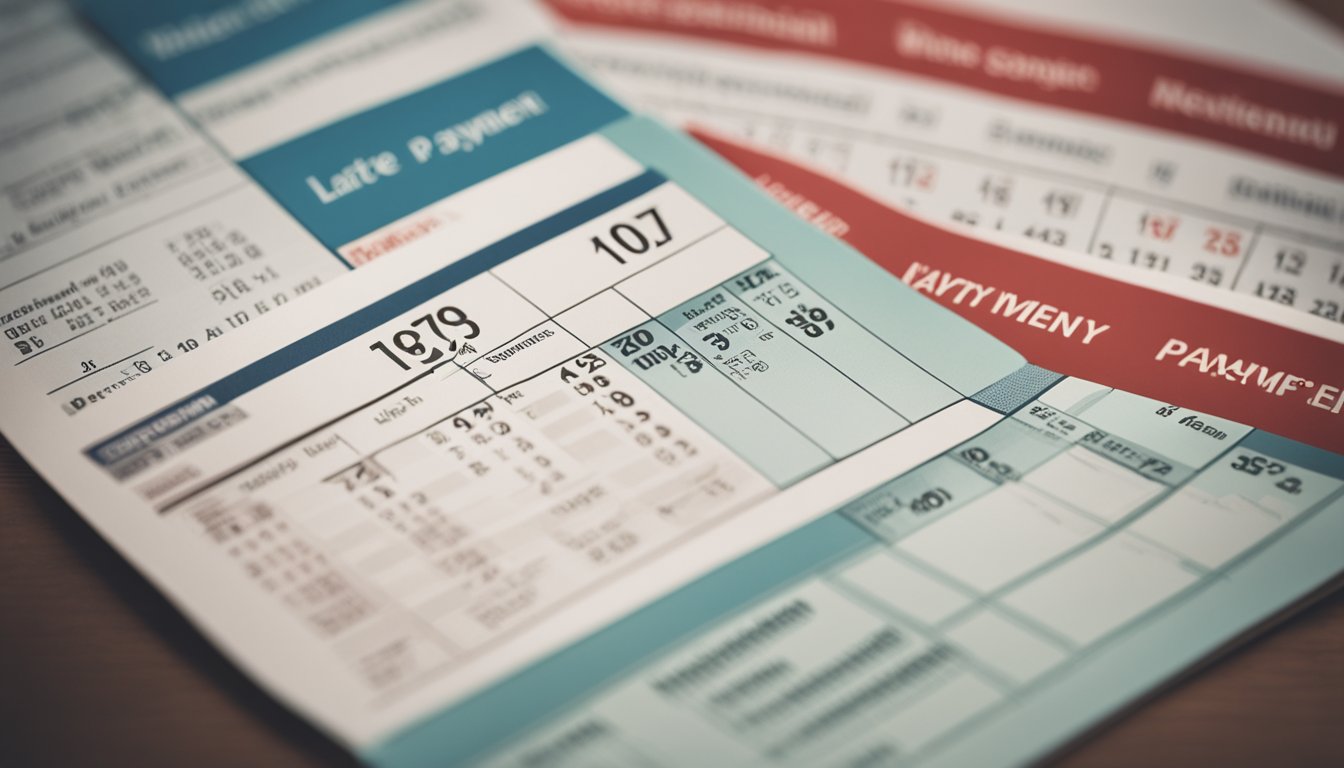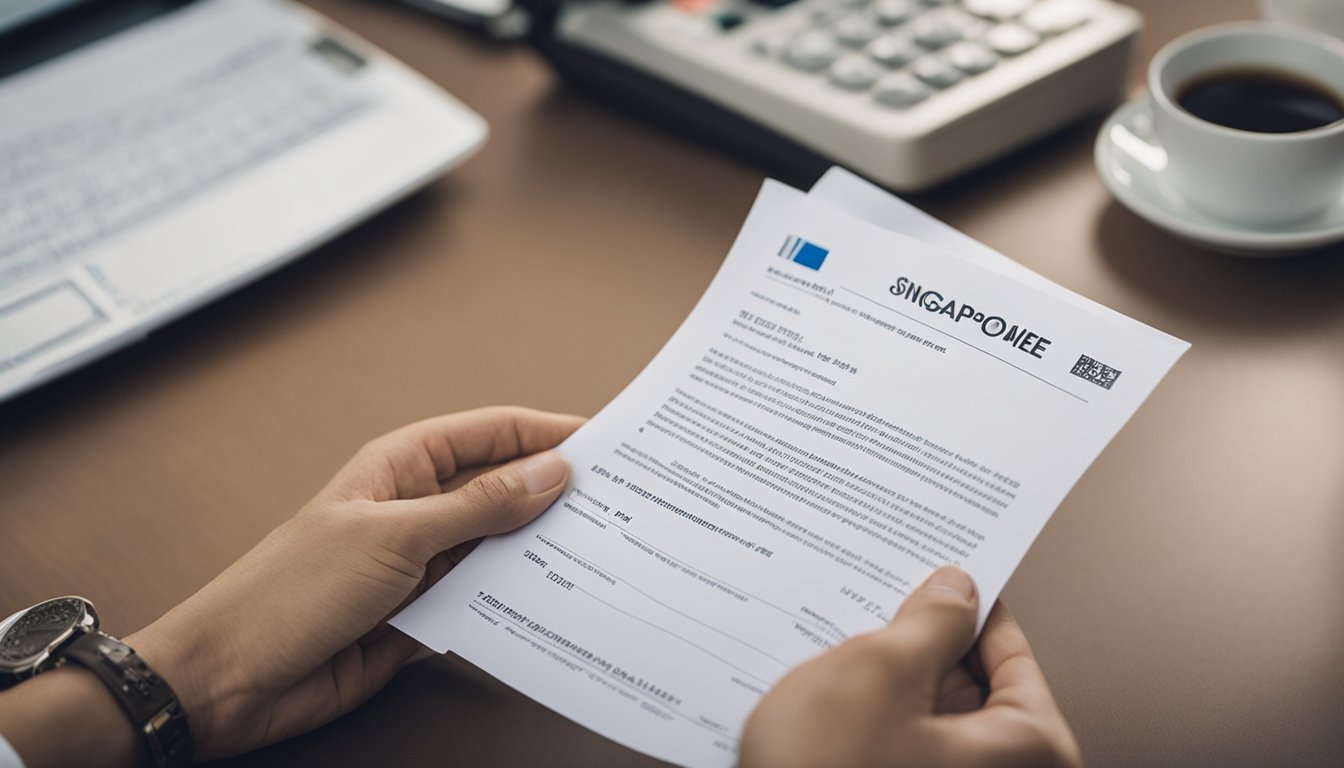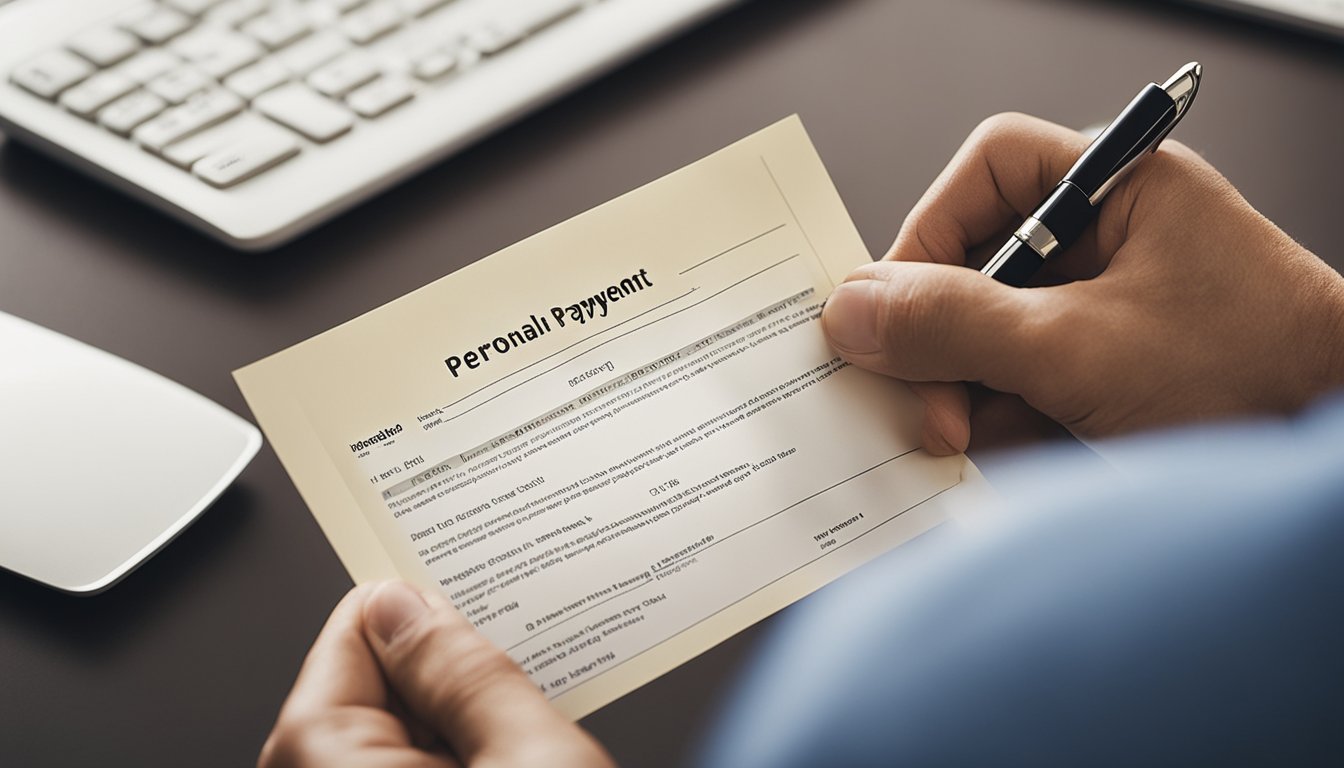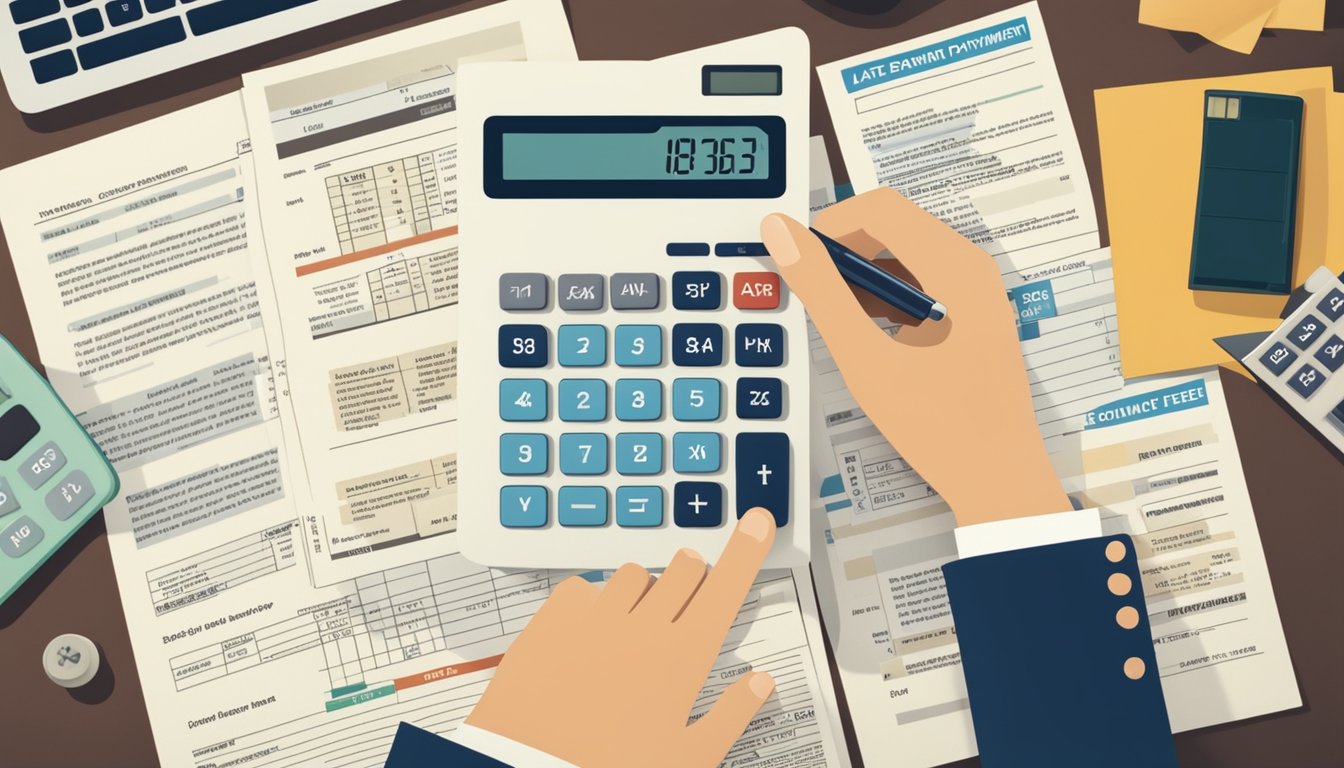Are you considering taking out a personal loan in Singapore? If so, it’s important to understand the potential consequences of missing a payment. A late payment fee is a charge imposed by lenders when you fail to make a scheduled payment on time. This fee can add up quickly, making it even more difficult to pay off your loan.

Late payment fees on personal loans in Singapore can vary depending on the lender and the terms of your loan agreement. Some lenders may charge a flat fee, while others may charge a percentage of your outstanding balance. In addition to the late payment fee, you may also be charged interest on any unpaid balance, further increasing the total amount you owe. It’s important to carefully review the terms of your loan agreement to understand the potential fees and charges you may face.
2 Min Read
Forget the snooze button, this is important! Missing a payment on your personal loan can land you with a nasty surprise: a late payment fee.
Think of it as a penalty for forgetting your gym membership. It’s not the end of the world, but it adds to the overall cost and can mess up your budget.
Here’s the lowdown:
- What it is: A charge by lenders when you miss a scheduled payment.
- How much? Varies depending on the lender, but can be a flat fee or a percentage of your outstanding balance.
- Consequences: Not only do you pay extra, but it can also hurt your credit score.
Want to avoid this fee-fiasco?
- Be on top of your game: Know your due dates and set up reminders or automatic payments.
- Hitting hard times? Talk to your lender ASAP. They might offer flexible repayment options.
Remember: Late fees are no joke. By staying informed and planning ahead, you can keep your finances on track and avoid this extra burden.
Bonus tip: For a deeper dive, check out the full article for details on calculating loan costs, managing repayments, and applying for personal loans in Singapore.
Understanding Personal Loans in Singapore

If you’re considering taking out a personal loan in Singapore, it’s important to understand the key features of personal loans and the types of personal loans available. This will help you make an informed decision and avoid any surprises down the road.
Key Features of Personal Loans
Personal loans are a type of borrowing that allows you to borrow a fixed amount of money from a bank or moneylender. You then repay the loan over a set period of time, usually in monthly instalments.
Here are some key features of personal loans in Singapore:
- Loan amount: The amount you can borrow depends on your creditworthiness and the lender’s policies.
- Loan duration: The duration of the loan can range from a few months to several years.
- Interest rate: The interest rate is the cost of borrowing the money and is usually expressed as an annual percentage rate (APR). It is important to compare interest rates from different financial institutions to find the best deal.
- Processing fees: Some lenders charge a processing fee when you apply for a personal loan.
- Late payment fees: If you miss a payment or make a late payment, you may be charged a late payment fee.
- Early repayment fees: Some lenders charge a fee if you repay the loan early.
Types of Personal Loans Available
There are two main types of personal loans available in Singapore: personal line of credit and term loan.
A personal line of credit is a type of loan that allows you to borrow money up to a certain credit limit. You can borrow as much or as little as you need, and you only pay interest on the amount you borrow. This type of loan is flexible and can be useful for managing unexpected expenses.
A term loan is a type of loan that allows you to borrow a fixed amount of money and repay it over a set period of time. This type of loan is useful for larger expenses, such as home renovations or a new car.
When deciding which type of personal loan to choose, it’s important to consider your needs and financial situation. A personal line of credit may be more suitable if you need flexibility, while a term loan may be better if you need a larger amount of money.
Eligibility Criteria for Personal Loans

When applying for a personal loan in Singapore, you need to meet certain eligibility criteria. Here are some of the requirements you need to fulfill:
Requirements for Singaporeans and PRs
If you are a Singaporean or a Permanent Resident (PR), you need to be at least 21 years old and have a valid NRIC. You should also have a good credit score and a stable income source. Most banks and financial institutions require a minimum annual income of SGD 20,000 – SGD 30,000 for Singaporeans and PRs.
Foreign Nationals’ Eligibility
Foreign nationals can also apply for personal loans in Singapore. However, the eligibility criteria may vary depending on the bank or financial institution. Generally, you need to be at least 21 years old and have a valid passport and employment pass or S Pass. Some banks may also require you to have a minimum annual income of SGD 40,000 – SGD 60,000.
Income and Employment Considerations
Your income and employment status are important factors that determine your eligibility for a personal loan. If you are a salaried employee, you need to provide your latest payslip and employment letter. Self-employed individuals need to provide their latest income tax assessment and bank statements. Commission-based earners need to provide their commission statements for the last 6 months.
Late Payment Fees on Personal Loans

Late payment fees on personal loans in Singapore can be a significant concern if you miss a payment. It’s important to understand how these fees are determined, the consequences of missing a payment, and how to avoid them.
How Late Payment Fees are Determined
Late payment fees are typically determined based on a percentage of the missed repayment amount. This can vary between lenders, so it’s essential to check your loan agreement for the specific late payment fee structure. In addition to the late payment fee, you may also incur late payment interest, which can significantly increase the overall amount you owe.
Consequences of Missing a Payment
Missing a payment on your personal loan can have several consequences. Not only will you incur late payment fees and interest, but it can also negatively impact your credit score. This can affect your ability to borrow in the future and may result in higher interest rates on future loans.
Avoiding Late Payment Fees
To avoid late payment fees, it’s crucial to stay on top of your repayment schedule. Ensure that you are aware of your payment due dates and have a clear understanding of your minimum payment due. Setting up automatic payments or reminders can help you avoid missing a payment and incurring late fees and interest. If you are experiencing financial difficulties, it’s advisable to contact your lender to discuss alternative repayment options.
By understanding how late payment fees are determined, the consequences of missing a payment, and how to avoid them, you can effectively manage your personal loan and maintain a healthy financial profile.
Calculating the Cost of Borrowing

As you consider taking out a personal loan, it’s important to understand the cost of borrowing. This includes not only the interest rate, but also any fees associated with the loan. In this section, we’ll explore some key factors to consider when calculating the cost of borrowing.
Interest Rates and Fees
One of the most important factors to consider when calculating the cost of borrowing is the interest rate. This is the percentage of the loan amount that you’ll pay in interest over the course of the loan term. In addition to the interest rate, you may also be charged fees such as a processing fee or an annual fee.
It’s important to note that some lenders may advertise a low interest rate, but then charge high fees. When comparing loan options, it’s important to look at both the interest rate and any fees associated with the loan to get a clear picture of the total cost of borrowing.
Effective Interest Rate (EIR) Explained
When calculating the cost of borrowing, it’s also important to consider the effective interest rate (EIR). This is the true cost of borrowing, taking into account both the interest rate and any fees associated with the loan.
The EIR is calculated using a formula that takes into account the loan amount, interest rate, and any fees associated with the loan. This gives you a more accurate picture of the total cost of borrowing, and can help you compare loan options more effectively.
Keep in mind that late payment fees and early repayment fees may also apply, so it’s important to read the loan agreement carefully and understand all of the terms and conditions before signing on the dotted line.
By understanding the interest rates, fees, and EIR associated with a personal loan, you can make an informed decision about whether it’s the right option for you.
Tip
Excited to dive into personal loans? Here’s a game-changing tip: when comparing loan options, always focus on the Effective Interest Rate (EIR). This little-known gem accounts for both the interest rate and any sneaky fees, giving you the real scoop on the total cost of borrowing.
Don’t be fooled by flashy low interest rates—peek at the EIR for the full picture! And remember, keep an eye out for late payment fees and early repayment fees hiding in the fine print. Armed with this savvy tip, you’re ready to conquer the world of personal loans like a financial guru!
Additional Charges and Fees

When taking out a personal loan, it’s important to be aware of any additional charges and fees that may apply. In addition to the interest rate, you may be charged processing fees and annual fees.
Processing and Annual Fees
Processing fees are typically charged when you apply for a loan and can range from 1% to 5% of the loan amount. Some lenders may also charge an annual fee, which is a fee that is charged each year for the duration of the loan. It’s important to read the terms and conditions carefully to understand what fees will be charged and when.
Other Potential Costs
In addition to processing and annual fees, there may be other potential costs associated with taking out a personal loan. These may include insurance, legal fees, and taxes. It’s important to understand what these costs are and how they will affect the total cost of the loan.
If you decide to pay off your loan early, you may also be charged an early repayment fee. This is a fee that is charged if you pay off your loan before the end of the loan term. It’s important to read the terms and conditions carefully to understand what fees will be charged and when.
Some lenders may also offer a credit card limit or credit line as part of the loan package. If this is the case, there may be additional annual fees associated with these services. It’s important to understand what these fees are and how they will affect the total cost of the loan.
Overall, it’s important to be aware of all the potential costs associated with taking out a personal loan. By reading the terms and conditions carefully and understanding what fees will be charged and when, you can make an informed decision about whether a personal loan is right for you.
Managing Your Loan Repayments

Late payment fees can add up quickly and cause a financial strain on your personal loan. To avoid these fees, it’s important to manage your loan repayments effectively. Here are some tips to help you stay on top of your payments.
Creating a Repayment Plan
Creating a repayment plan can help you stay on track with your loan repayments. Start by reviewing your loan agreement to understand the repayment schedule and loan tenure. Then, create a budget that allows you to make your monthly payments on time. Consider setting up a GIRO arrangement with your bank to automate your payments and avoid late fees.
Options for Repayment
If you find yourself struggling to make your loan repayments, there are options available to you. You can contact your lender to discuss a repayment plan that better suits your financial situation. Alternatively, you can consider refinancing your loan to lower your monthly payments. However, keep in mind that refinancing may extend your loan tenure and increase the total amount of interest you pay.
Impact on Credit Score
Late payments can have a negative impact on your credit score. Your credit score is a reflection of your creditworthiness and is used by lenders to determine your eligibility for financing. Late payments can lower your score and make it more difficult to obtain financing in the future. To avoid this, make sure to make your loan payments on time and in full.
Managing your loan repayments can be challenging, but with a little planning and effort, you can avoid late payment fees and protect your credit score. By creating a repayment plan, exploring your options for repayment, and staying on top of your payments, you can successfully manage your personal loan and achieve your financial goals.
How to Apply for a Personal Loan

Getting a personal loan in Singapore is a quick and easy process. Here are the steps you need to follow to apply for a personal loan:
Application Process
- Search for a licensed moneylender or a bank that offers personal loans in Singapore.
- Visit their website or branch office to start the application process.
- Fill out the application form with your personal and financial details.
- Submit the required documentation for verification.
Documentation Required
To apply for a personal loan, you will need to provide the following documents:
- NRIC or passport
- Notice of assessment
- MyInfo (if available)
- Proof of address
- Proof of income (latest payslips, bank statements, etc.)
Approval and Disbursement
Once your loan application is approved, the lender will disburse the loan amount to your bank account. The disbursement time may vary depending on the lender and the mode of disbursement.
It is important to note that late payment fees may apply if you miss any instalments or pay less than the fixed repayment amount by the due date. Therefore, it is important to make sure you have a solid repayment plan in place before you apply for a personal loan.
Digital Banking and Loan Services

If you’re looking for a personal loan in Singapore, you’ll be pleased to know that many banks now offer digital banking and loan services. This means that you can apply for a loan online, manage your account through a mobile app, and even make payments through SMS or at ATMs.
Online Application and Management
With digital banking, you can apply for a personal loan from the comfort of your own home. You can browse loan options, compare interest rates, and find the best promotions that suit your needs. Once you’ve found the loan that’s right for you, you can apply online and receive an instant approval decision.
After you’ve been approved for a loan, you can manage your account online. This includes checking your balance, reviewing your repayment schedule, and making fixed repayments. You can also set up automatic bill payments to ensure that you never miss a payment and incur a late payment fee.
Mobile Banking Features
In addition to online management, many banks offer mobile banking features that allow you to manage your personal loan on the go. This includes making bill payments, checking your balance, and even withdrawing cash from ATMs. You can also transfer funds to other accounts or pay bills through your mobile app.
With mobile banking, you can receive notifications when your payment is due, so you never miss a payment. You can also set up SMS alerts to remind you of your repayment schedule and when your payment is due. This ensures that you stay on top of your repayments and avoid any late payment fees.
Overall, digital banking and loan services have made it easier than ever to apply for and manage personal loans in Singapore. With online and mobile banking features, you can manage your account from anywhere and avoid any late payment fees. So why not apply for a personal loan today and take advantage of these exciting features?
Frequently Asked Questions
How can one avoid incurring late payment fees on personal loans?
To avoid incurring late payment fees on personal loans, it is important to make your repayments on time. You can set up automatic payments or reminders to ensure that you do not miss a payment deadline. Additionally, you can consider paying more than the minimum payment required to reduce the risk of incurring a late payment fee.
What are the consequences of missing a personal loan repayment deadline?
If you miss a personal loan repayment deadline, you may be charged a late payment fee. This fee can be a fixed amount or a percentage of the outstanding balance. Additionally, missing a payment can negatively impact your credit score, making it more difficult to obtain credit in the future.
Is it possible to negotiate a late payment fee waiver with Singaporean banks?
Yes, it is possible to negotiate a late payment fee waiver with Singaporean banks. However, this will depend on the bank’s policies and your individual circumstances. It is recommended that you contact your bank as soon as possible to discuss your options.
What steps should I take if my late payment fee waiver request has been denied?
If your late payment fee waiver request has been denied, you may want to consider making a formal complaint to the bank. You can also consider refinancing your loan with another bank or financial institution.
How does the late payment fee for a personal loan compare to other types of credit?
The late payment fee for a personal loan can vary depending on the bank and your individual circumstances. However, it is generally higher than the late payment fee for credit cards or other types of credit.
Are there any methods to reduce or eliminate late payment fees on personal loans?
To reduce or eliminate late payment fees on personal loans, you can consider refinancing your loan with another bank or financial institution. Additionally, you can contact your bank to discuss your options and negotiate a payment plan that works for you.
Cash crunch got you down? Here’s your escape hatch!
Forget juggling bills or putting dreams on hold. Quick Credit Pte Ltd makes getting a personal loan in Singapore as easy as ABC (and way faster!).
Why are Singaporeans borrowing more?
- Daily costs are skyrocketing.
- Dream vacation calling?
- Gotta have the latest tech?
Whatever your reason, Quick Credit has your back. No judgment, just solutions.
Ready to ditch the stress? Here’s what you need:
- NRIC/Work Pass: Prove you’re you (and legally allowed to borrow).
- Latest payslips (3 months): Show us you’re a responsible borrower.
- CPF statements: We gotta check your financial health.
- Proof of address: Just to make sure we know where to send your money (not your neighbor’s!).
Don’t wait! Get started today and breathe easy.
